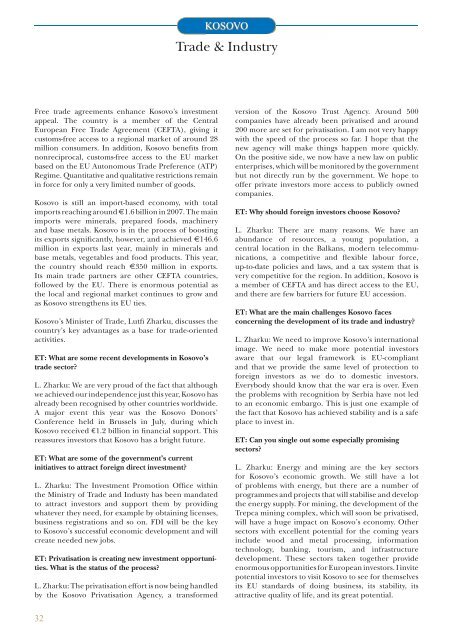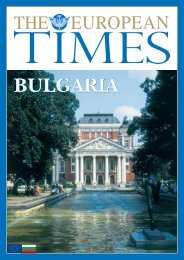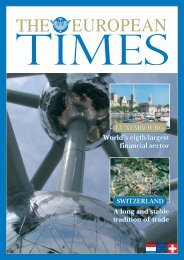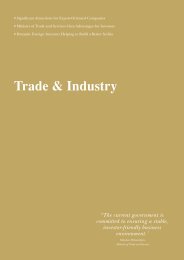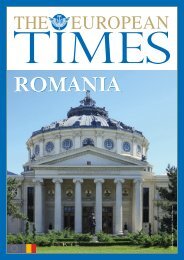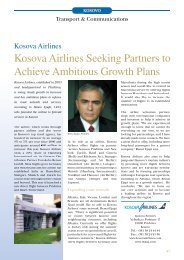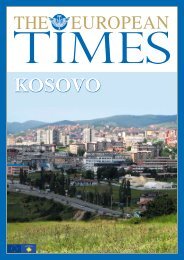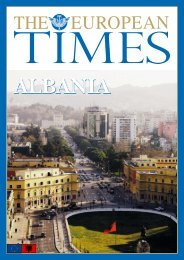KOSOVO - The European Times
KOSOVO - The European Times
KOSOVO - The European Times
- No tags were found...
You also want an ePaper? Increase the reach of your titles
YUMPU automatically turns print PDFs into web optimized ePapers that Google loves.
<strong>KOSOVO</strong>Trade & IndustryFree trade agreements enhance Kosovo’s investmentappeal. <strong>The</strong> country is a member of the Central<strong>European</strong> Free Trade Agreement (CEFTA), giving itcustoms-free access to a regional market of around 28million consumers. In addition, Kosovo benefits fromnonreciprocal, customs-free access to the EU marketbased on the EU Autonomous Trade Preference (ATP)Regime. Quantitative and qualitative restrictions remainin force for only a very limited number of goods.Kosovo is still an import-based economy, with totalimports reaching around €1.6 billion in 2007. <strong>The</strong> mainimports were minerals, prepared foods, machineryand base metals. Kosovo is in the process of boostingits exports significantly, however, and achieved €146.6million in exports last year, mainly in minerals andbase metals, vegetables and food products. This year,the country should reach €350 million in exports.Its main trade partners are other CEFTA countries,followed by the EU. <strong>The</strong>re is enormous potential asthe local and regional market continues to grow andas Kosovo strengthens its EU ties.Kosovo’s Minister of Trade, Lutfi Zharku, discusses thecountry’s key advantages as a base for trade-orientedactivities.ET: What are some recent developments in Kosovo’strade sector?L. Zharku: We are very proud of the fact that althoughwe achieved our independence just this year, Kosovo hasalready been recognised by other countries worldwide.A major event this year was the Kosovo Donors’Conference held in Brussels in July, during whichKosovo received €1.2 billion in financial support. Thisreassures investors that Kosovo has a bright future.ET: What are some of the government’s currentinitiatives to attract foreign direct investment?L. Zharku: <strong>The</strong> Investment Promotion Office withinthe Ministry of Trade and Industy has been mandatedto attract investors and support them by providingwhatever they need, for example by obtaining licenses,business registrations and so on. FDI will be the keyto Kosovo’s successful economic development and willcreate needed new jobs.ET: Privatisation is creating new investment opportunities.What is the status of the process?L. Zharku: <strong>The</strong> privatisation effort is now being handledby the Kosovo Privatisation Agency, a transformedversion of the Kosovo Trust Agency. Around 500companies have already been privatised and around200 more are set for privatisation. I am not very happywith the speed of the process so far. I hope that thenew agency will make things happen more quickly.On the positive side, we now have a new law on publicenterprises, which will be monitored by the governmentbut not directly run by the government. We hope tooffer private investors more access to publicly ownedcompanies.ET: Why should foreign investors choose Kosovo?L. Zharku: <strong>The</strong>re are many reasons. We have anabundance of resources, a young population, acentral location in the Balkans, modern telecommunications,a competitive and flexible labour force,up-to-date policies and laws, and a tax system that isvery competitive for the region. In addition, Kosovo isa member of CEFTA and has direct access to the EU,and there are few barriers for future EU accession.ET: What are the main challenges Kosovo facesconcerning the development of its trade and industry?L. Zharku: We need to improve Kosovo’s internationalimage. We need to make more potential investorsaware that our legal framework is EU-compliantand that we provide the same level of protection toforeign investors as we do to domestic investors.Everybody should know that the war era is over. Eventhe problems with recognition by Serbia have not ledto an economic embargo. This is just one example ofthe fact that Kosovo has achieved stability and is a safeplace to invest in.ET: Can you single out some especially promisingsectors?L. Zharku: Energy and mining are the key sectorsfor Kosovo’s economic growth. We still have a lotof problems with energy, but there are a number ofprogrammes and projects that will stabilise and developthe energy supply. For mining, the development of theTrepca mining complex, which will soon be privatised,will have a huge impact on Kosovo’s economy. Othersectors with excellent potential for the coming yearsinclude wood and metal processing, informationtechnology, banking, tourism, and infrastructuredevelopment. <strong>The</strong>se sectors taken together provideenormous opportunities for <strong>European</strong> investors. I invitepotential investors to visit Kosovo to see for themselvesits EU standards of doing business, its stability, itsattractive quality of life, and its great potential.32


